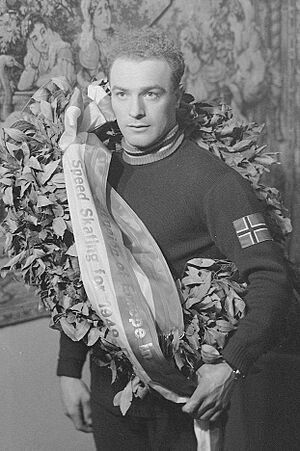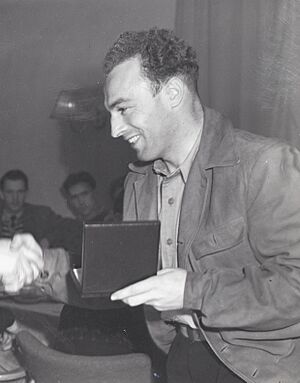Sverre Farstad facts for kids

Farstad in 1949
|
||||||||||||||||||||||||||
| Personal information | ||||||||||||||||||||||||||
|---|---|---|---|---|---|---|---|---|---|---|---|---|---|---|---|---|---|---|---|---|---|---|---|---|---|---|
| Born | 8 February 1920 Trondheim, Norway |
|||||||||||||||||||||||||
| Died | 27 March 1978 (aged 58) | |||||||||||||||||||||||||
| Sport | ||||||||||||||||||||||||||
| Country | Norway | |||||||||||||||||||||||||
| Sport | Speed skating | |||||||||||||||||||||||||
| Club | Sportsklubben Falken | |||||||||||||||||||||||||
| Achievements and titles | ||||||||||||||||||||||||||
| Personal best(s) | 500 m: 41.8 (1949) 1000 m: 1:29.7 (1950) 1500 m: 2:13.6 (1949) 3000 m: 4:59.2 (1949) 5000 m: 8:15.4 (1949) 10 000 m: 17:39.7 (1949) |
|||||||||||||||||||||||||
|
Medal record
|
||||||||||||||||||||||||||
Sverre Farstad was a famous Norwegian speed skater. He was born on February 8, 1920, and passed away on March 27, 1978. Sverre skated for a club called Sportsklubben Falken in Trondheim. He was part of a well-known group called the "Falken Trio," along with Henry Wahl and Hjalmar Andersen. In his short three-year international career, Sverre won an Olympic gold medal and a European Championship title.
| Top - 0-9 A B C D E F G H I J K L M N O P Q R S T U V W X Y Z |
Sverre's Early Skating Career
Before World War II, Sverre competed in "workers' races." In 1940, he placed second in the Norwegian Workers' Championship for the 5,000-meter race. During the war, he trained hard in weightlifting and gymnastics in Trondheim.
After the war, he returned to international speed skating. In 1947, he won a bronze medal at the European Speed Skating Championships. He was the fastest in the 1,500-meter race at that event. Later that year, he earned a silver medal at the World Championship. He won both the 500-meter and 1,500-meter races there. He was very close to becoming the world champion, missing it by just 2.2 seconds. He finished second overall after the 10,000-meter race.
Sverre was also a talented athlete in other sports. In 1947, he received the Egebergs Ærespris award. This award is given to Norwegian athletes who excel in multiple sports. He had won two silver medals in Norwegian weightlifting championships. He also won a bronze medal in rowing. Sverre also competed in boxing, cycling, sport shooting, swimming, and amateur wrestling.
Winning Gold at the 1948 Olympics
Sverre was chosen for the Norwegian team at the 1948 Winter Olympics in St. Moritz, Switzerland. He was a favorite to win the 1,500-meter race. He won the race with a time of 2 minutes and 17.6 seconds. A Swedish skater, Åke Seyffarth, was ahead for most of his race. But Sverre's final lap was incredibly fast, and Seyffarth finished 0.5 seconds behind him.
Sverre Farstad became the first person from the Trøndelag region of Norway to win an Olympic gold medal. He also finished sixth in the 500-meter event. After the Olympics, he received a huge welcome back home in Trondheim. He celebrated with other Olympic skaters from Trøndelag, including silver medalist Thomas Byberg.
Two weeks after the Olympics, Sverre competed in the European Championships in Hamar, Norway. He finished fourth overall. He won the 1,500-meter race again at this event. He had a good lead after three distances, but he couldn't hold onto it in the final long race. Two weeks later, at the World Championships in Helsinki, he finished eleventh overall.
After the Olympic Victory
Sverre Farstad never became the Norwegian Champion. In 1949, Reidar Liaklev beat him, and Sverre finished second. However, in 1949, Sverre returned to Graubünden, Switzerland, where he had won his Olympic medal. There, he won the European Championships!
He started strong by skating the 500-meter race in 41.8 seconds. This time equaled the world record set by Hans Engnestangen. He beat his closest competitor by 1.6 seconds. On the 5,000-meter race, Kornél Pajor beat him and set a new world record. But Sverre was still in the lead after the first day.
He then won the 1,500-meter race by 2.5 seconds. His time was just a tiny bit slower than the world record. This gave him a big lead before the final 10,000-meter race. Even though he finished eleventh in the 10,000 meters, he still won the championship. He also set the first official world record for the "big combination" in speed skating. This record stood for six years.
Two weeks later, Sverre was not feeling well after the European Championship. He failed to qualify for the 10,000-meter race at the World Championship in Oslo. This was his last major international allround championship. However, he won the 500-meter race in the Norwegian Championship in 1950. He also won the 500 meters in national matches against Sweden in 1950 and 1951.
Sverre worked full-time as a journalist for a newspaper called Arbeiderbladet. He continued this job until he passed away in 1978. He also worked part-time as a coach for the Italian speed skating team from 1957 to 1960. He helped Renato De Riva become the first Italian to qualify for the 10,000 meters in an international championship after World War II.
Sverre's World Record
During his career, Sverre Farstad set one official world record:
| Discipline | Time | Date | Location |
|---|---|---|---|
| Big combination | 188.958 | 6 February 1949 |
Sverre was the first official world record holder for the "big combination." This was because the International Skating Union (ISU) decided to make the "big combination" an official world record event for the first time.
Sverre's Best Times
Here are Sverre Farstad's personal best times in speed skating. The "WR" column shows the official world record at the time he set his personal best.
| Event | Result | Date | Venue | WR |
|---|---|---|---|---|
| 500 m | 41.8 | 5 February 1949 | Davos | 41.8 |
| 1,000 m | 1:29.7 | 18 January 1950 | Gjøvik | 1:28.4 |
| 1,500 m | 2:13.9 | 6 February 1949 | Davos | 2:13.8 |
| 3,000 m | 4:59.2 | 12 February 1949 | Trondheim | 4:45.7 |
| 5,000 m | 8:15.4 | 5 February 1949 | Davos | 8:13.7 |
| 10,000 m | 17:39.7 | 6 February 1949 | Davos | 17:01.5 |
| Big combination | 188.958 | 6 February 1949 | Davos | none |
Sverre's personal best for the "big combination" (188.958 points) is the same as his Adelskalender score. This happened because at the 1949 European Championships, he set new personal bests in all four "big combination" distances. This amazing achievement also made him the first official world record holder for the "big combination." His highest ranking on the Adelskalender was third place.
 | William M. Jackson |
 | Juan E. Gilbert |
 | Neil deGrasse Tyson |


